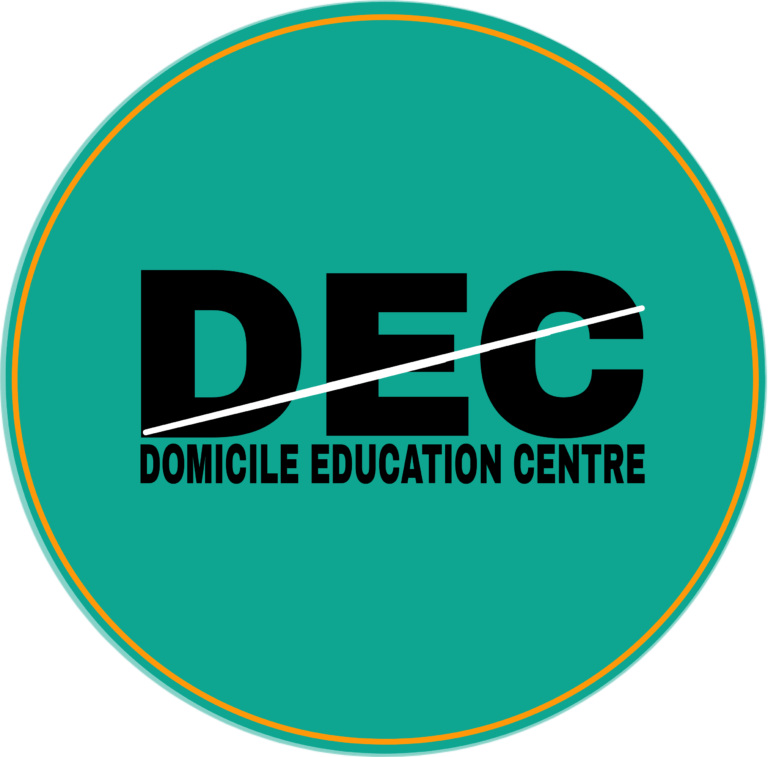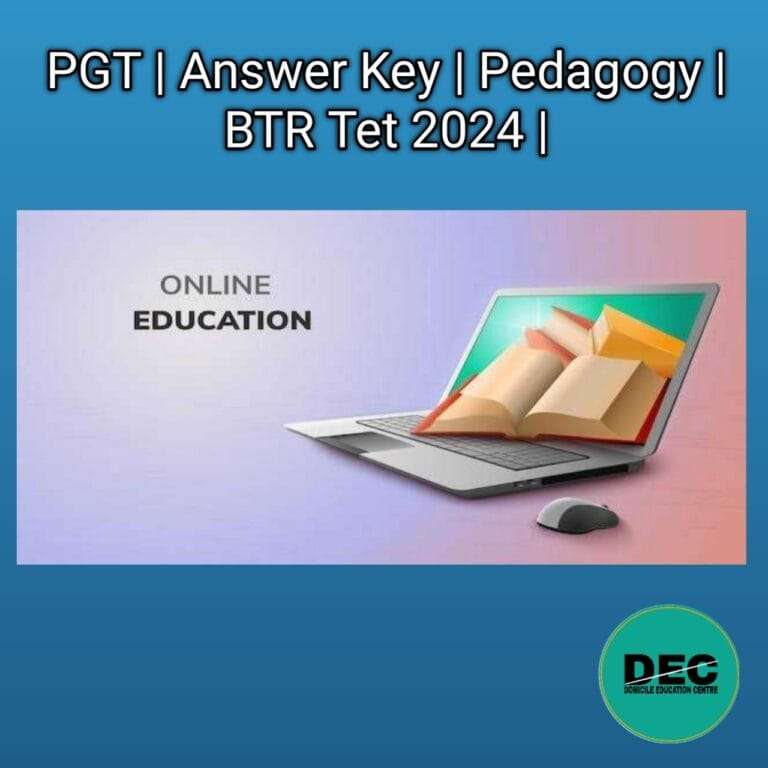Table of Contents
TogglePGT | Answer Key | Pedagogy | BTR Tet 2024 |
Post Graduate Teacher 2024
Marks - 50
Here You will PGT | Answer Key | Pedagogy | BTR Tet 2024 |Post Graduate Teacher under Department of Bodoland University.
TET CUM RECRUITMENT WRITTEN TEST
FOR THE POST OF
POST GRADUATE TEACHER – 2024
DEPARTMENT OF EDUCATION
BODOLAND TERRITORIAL COUNCIL (BTC)
PEDAGOGY
1. The process of decomposing information into its components so that could be examined and understood is known as
A. Evaluation
B. Synthesis
C. Analysis
D. Application
Ans: Option C. Analysis
2. The ability of using new creative applications of prior knowledge and skills is known as
A. Evaluation
B. Synthesis
C. Analysis
D. Application
Ans: Option B. Synthesis
3. A common technique that helps people to begin the creative process is
A. Calculation
B. Brain storming
C. Thoroughness
D. Mental shortness
Ans: Option B. Brain storming
4. Pedagogy is a Greek word which literally means
A. To understand the child
B. To Gide the child
C. To educate the child
D. To Lead the child
Ans: Option D. To Lead the child
5. Pedagogy is the study of
A. Education
B. Learning process
C. Teaching methods
D. Guiding students
Ans: Option C. Teaching methods
6. The philosopher who worked in mathematical and scientific didactic was
A. Jean Piaget
B. John Dewey
C. Martin Wagen Schein
D. Lev Vygotsky
Ans: Option C. Martin Wagen Schein
7. The concept of teaching the whole child in “philosophy of pragmatism in education” means teaching students to be good
A. Learners
B. Thinkers
C. Scientists
D. Citizens
Ans: Option D. Citizen
8. As people grow older, the ___________ of the learning declines
A. Speed
B. Power
C. Quality
D. Quantity
Ans: Option A. Speed
9. The book Emile or “On Education” on the nature of education and man is written by
A. Aristotle
B. Plato
C. John Dewey
D. Rousseau
Ans: Option D. Rousseau
10. According to Emile, the noblest work in education is to make a/an
A. Good Citizen
B. Reasoning Man
C. Thinker
D. Entrepreneur
Ans: Option B. Reasoning Man
11. What is meant by “Symposium” in the academic world?
A. Lecture
B. Museum
C. Training
D. Conference
Ans: Option D. Conference
12. Teachers should present information to the students clearly and in an interesting way, and relate this new information to the things students
A. Don’t Know
B. Already Know
C. Willing to Know
D. Not Willing To Know
Ans: Option B. Already Know
13. According to John Dewey, school is a __________ institution, and education is a __________ process.
A. Social, Social
B. Social, Philosophical
C. Philosophical, Philosophical
D. Environmental, Psychological
Ans: Option A. Social, Social
14. According to John Dewey, schools must prepare students for
A. Present Life
B. Future Life
C. Entrepreneurship
D. Research
Ans: Option A. Present Life
15. Responses that produce a satisfying effect in a particular situation become __________ to occur again in that situation.
A. Not Likely
B. Equally Likely
C. Less Likely
D. More Likely
Ans: Option D. More Likely
16. Responses that produce a discomforting effect become __________ to occur again in that situation.
A. Not Likely
B. Equally Likely
C. Less Likely
D. More Likely
Ans: Option C. Less Likely
17. According to Rousseau, at what age is a person ready to have a companion of the opposite sex?
A. 16
B. 17
C. 18
D. 19
Ans: Option A. 16
18. The field of study concerned with the construction of thought processes, including remembering, problem solving, and decision-making is called
A. Education
B. Pedagogy
C. Cognitive Development
D. Epistemology
Ans: Option C. Cognitive Development
19. Jean Piaget proposed _____________ stages of Cognitive Development.
A. 3
B. 4
C. 5
D. 6
Ans: Option B. 4
20. The more often a particular ability is used the __________ it becomes.
A. More Important
B. Less Important
C. Stronger
D. Weaker
Ans: Option C. Stronger
21. The longer a particular ability is unused the ____________ it becomes.
A. More Important
B. Less Important
C. Stronger
D. Weaker
And: Option D. Weaker
22. According to Jean Piaget, children develop abstract logic and reasoning skills during
A. Sensory stage
B. Preoperational stage
C. Concrete operational stage
D. Formal operational stage
Ans: Option D. Formal operational stage.
23. Children are usually egocentric during ____________ and _____________ stages.
A. Sensorimotor, Preoperational
B. Preoperational, Concrete operational
C. Concreate operational, Formal operational
D. Formal operational, Sensorimotor
Ans: Option A. Sensorimotor, Preoperational
24. According to Jean Piaget, children are no longer egocentric when entering
A. Sensorimotor stage
B. Preoperational stage
C. Concrete operational stage
D. Formal operational stage
Ans: Option C. Concrete operational stage
25. According to Piaget’s theory of cognitive development, the Concrete operational stage starts at the age
A. 3
B. 7
C. 11
D. 15
Ans: Option B. 7
Archives
26. According to Piaget’s theory cognitive development, the Formal operational stage starts at age
A. 3
B. 7
C. 11
D. 15
Ans: Option C. 11
27. The most recent response is most likely to
A. Forget
B. Compromised
C. Reoccur
D. Not Occur Again
Ans: Option C. Reoccur
28. The famous book “The Republic” was written by
A. Socrates
B. Plato
C. Aristotle
D. John Locke
Ans: Option B. Plato
29. “All who have meditated on the art of governing mankind have been convinced that the fate of empires depends on the education of youth.” This is saying of
A. Aristotle
B. Socrates
C. Plato
D. John Locke
Ans: Option A. Aristotle
30. The Waldorf education approach emphasizes a balanced development of
A. Head and Heart
B. Head and Hands
C. Heart and Hands
D. Head, Heart, and Hands
Ans: Option D. Head, Heart, and Hands
31. Plato believed that talent and intelligence are
A. Distributed Genetically
B. Not Distributed Genetically
C. Distributed Gender-Wise
D. Not Distributed Gender-Wise
Ans: Option B. Not Distributed Genetically.
32. A prior knowledge is knowledge that is known independently of
A. Analysis
B. Information
C. Experience
D. Evidence
Ans: Option C. Experience
33. With reference to SOLO taxonomy, one aspect of a task is understood in?
A. Uninstructural level
B. Multistructural level
C. Rational level
D. Extended abstract
Ans: Option A. Uninstructional level.
34. According to John Locke, a child’s mind does not contain any
A. Innate ideas
B. Memory
C. Observation
D. Imagination
Ans: Option A. Innate ideas
35. The concept of pragmatism in educational philosophy says that education should be about
A. Obedience
B. Virtue
C. Life and Growth
D. Shaping Good Citizens
Ans: Option C. Life and Growth
36. According to Aristotle, virtue is a/an ____________ state between excess and deficiency.
A. Natural
B. Intermediate
C. Real
D. Artificial
Ans: Option B. Intermediate
37. In case of spending money, the virtue is ___________ between wastefulness and stinginess.
A. Generosity
B. Penury
C. Lavishness
D. Prodigal
Ans: Option A. Generosity
38. According to John Dewey, children should experience _____________ in school to make them better citizens.
A. Rules
B. Discipline
C. Democracy
D. Practical implementation
Ans: Option C. Democracy
39. Progressive believes that education comes from the experience of the
A. Child
B. Teacher
C. Principal
D. Society
Ans: Option A. Child
40. The idea of teaching child in the “philosophy of pragmatism in education” means teaching students to be good
A. Learners
B. Thinkers
C. Scientists
D. Citizens
Ans: Option D. Citizens
41. Progressive believes that the children learn in a/an
A. Community
B. Competition
C. Isolation
D. Closed Environment
Ans: Option A. Community
42. A normal human being has ______ senses.
A. 4
B. 5
C. 6
D. 7
Ans: Option B. 5
43. Which of the following is NOT among the five senses?
A. Vision
B. Touch
C. Smell
D. Thought
Ans: Option D. Thought
44. The application of ideas, knowledge, and skills to achieve the desired results is called
A. Problem Solving
B. Critical Thinking
C. Reasoned Argument
D. Deductive Method
Ans: Option A. Problem Solving
45. According to “Socrates of Meno”, virtue is
A. Teachable
B. Unteachable
C. Reachable
D. Unreachable
Ans: Option B. Unteachable
46. The term heuristic means _____________ in decision making.
A. Brain Storming
B. Calculations
C. Thoroughness
D. Mental Shortcuts
Ans: Option D. Mental Shortcuts
47. The level of school administration can best be judged through?
A. Beautiful building
B. Head teacher
C. Learning outcomes
D. Teacher students relations
Ans: Option C. Learning outcomes.
48. According to Robert Sternberg, the three different types of required intelligence for creativity are
A. Synthetic, Analytical, and Practical
B. Analytical, Observational and Practical
C. Analytical, Critical and Practical
D. Abstract, Synthetic and Analytical
Ans: Option A. Synthetic, Analytical, and Practical.
49. A common technique to help people begin the creative process is
A. Calculations
B. Brain Storming
C. Thoroughness
D. Mental Shortcuts
Ans: Option B. Brain Storming
50. According to Plato, the highest goal in all of education is knowledge of the
A. Science
B. Mathematics
C. Philosophy
D. Good
Ans: Option D. Good
xxxxxxxx
Calendar of Content List:
| M | T | W | T | F | S | S |
|---|---|---|---|---|---|---|
| 1 | ||||||
| 2 | 3 | 4 | 5 | 6 | 7 | 8 |
| 9 | 10 | 11 | 12 | 13 | 14 | 15 |
| 16 | 17 | 18 | 19 | 20 | 21 | 22 |
| 23 | 24 | 25 | 26 | 27 | 28 | |

